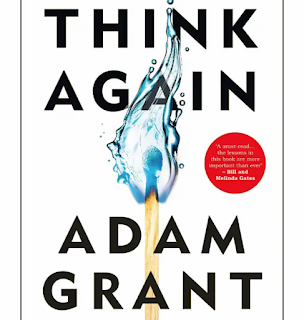Top 10 Lesson learned From the Book “Think Again” by Adam Grant
 |
Top 10 Lesson learned From the Book “Think Again” by Adam Grant |
Lesson 1. Think like a scientist.
A scientist is always in a rethinking loop which enables discovery of new knowledge.
If knowledge is power, knowing what we don’t know is wisdom.
Lesson 2. Develop Confident Humility
Humility isn’t about lack of self-confidence. It’s about being grounded.
Knowing that we are both flawed and fallible. Never losing sight of this reality. Confidence is about self belief.
Lesson 3. Detaching Opinion from Identity
We should avoid becoming too attached to our ideas and our beliefs. We shouldn’t let it become part of our identity.
When we let our ideas become part of our identity, we become hostile to the thought of being wrong.
Lesson 4. Argue about HOW and not WHY
WHY conversations often get emotional and ego led, and people become dismissive of the others.
Once you start discussing HOW, people start noticing the gaps in their knowledge and the flaw in their conclusions and become less argumentative.
Lesson 5. How to win debates and negotiate well
- Instead of attacking to weakest argument, acknowledge their best one
- Focus on fewer but stronger points
- Ask questions
Lesson 6. Changing mindsets through Motivational Interviewing
We can’t motivate people to change. We have a better chance helping them find their own motivation to change.
Keys:
- Asking open ended questions
- Engage in reflective listening
- Affirming the person’s ability
Lesson 7. Dealing with Polarised Mindsets
People operate with binary mindsets. Everything is black or white.
The solution lies in breaking this oversimplified extreme view by introducing complexity and nuance.
Lesson 8. Rethinking for Kids
The practise of doing multiple drafts instead of just one. Especially in creative projects.
More drafts mean more rethinking, reworking, polishing and fine-tuning. Leading eventually to a higher quality output.
Lesson 9. Learning Organizations
Combining Psychological Safety and Process Accountability to create a learning zone.
Honourable mention — Developing a culture of questioning by encouraging people to always ask “how do we know“.
Lesson 10. Career Planning and Identity Foreclosure
We need to stop asking kids what they want to do when they grow up.
 |
The choice becomes part of their identity. We need to encourage them that careers are actions to take and not identities to claim.
You live your life on auto pilot because you don’t know what to do with your life.







0 Comments